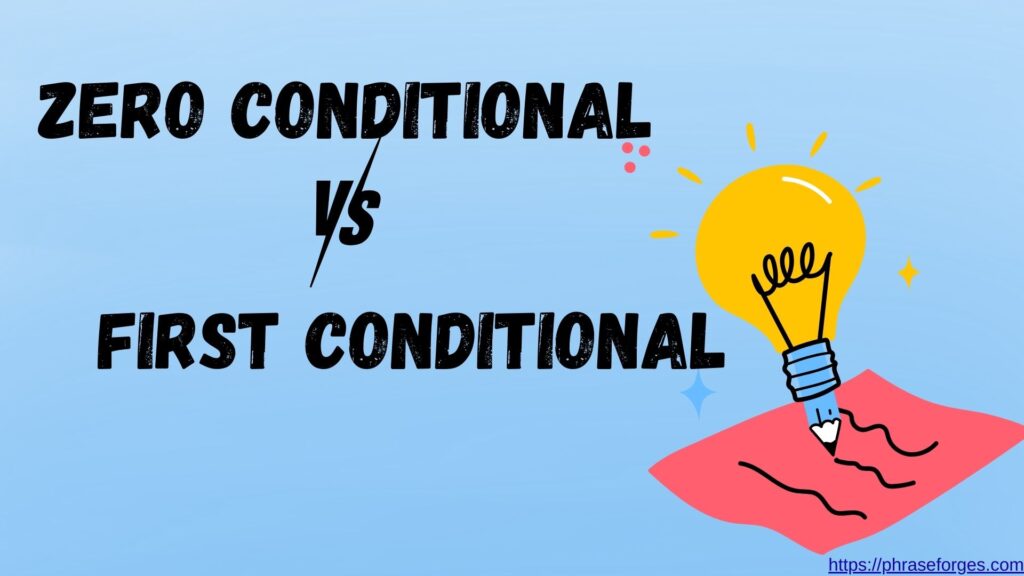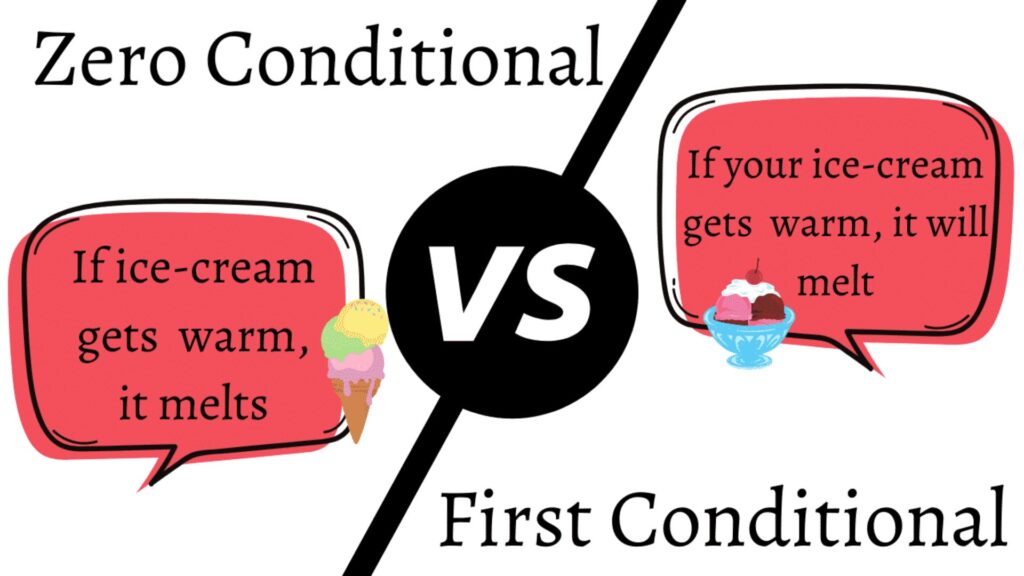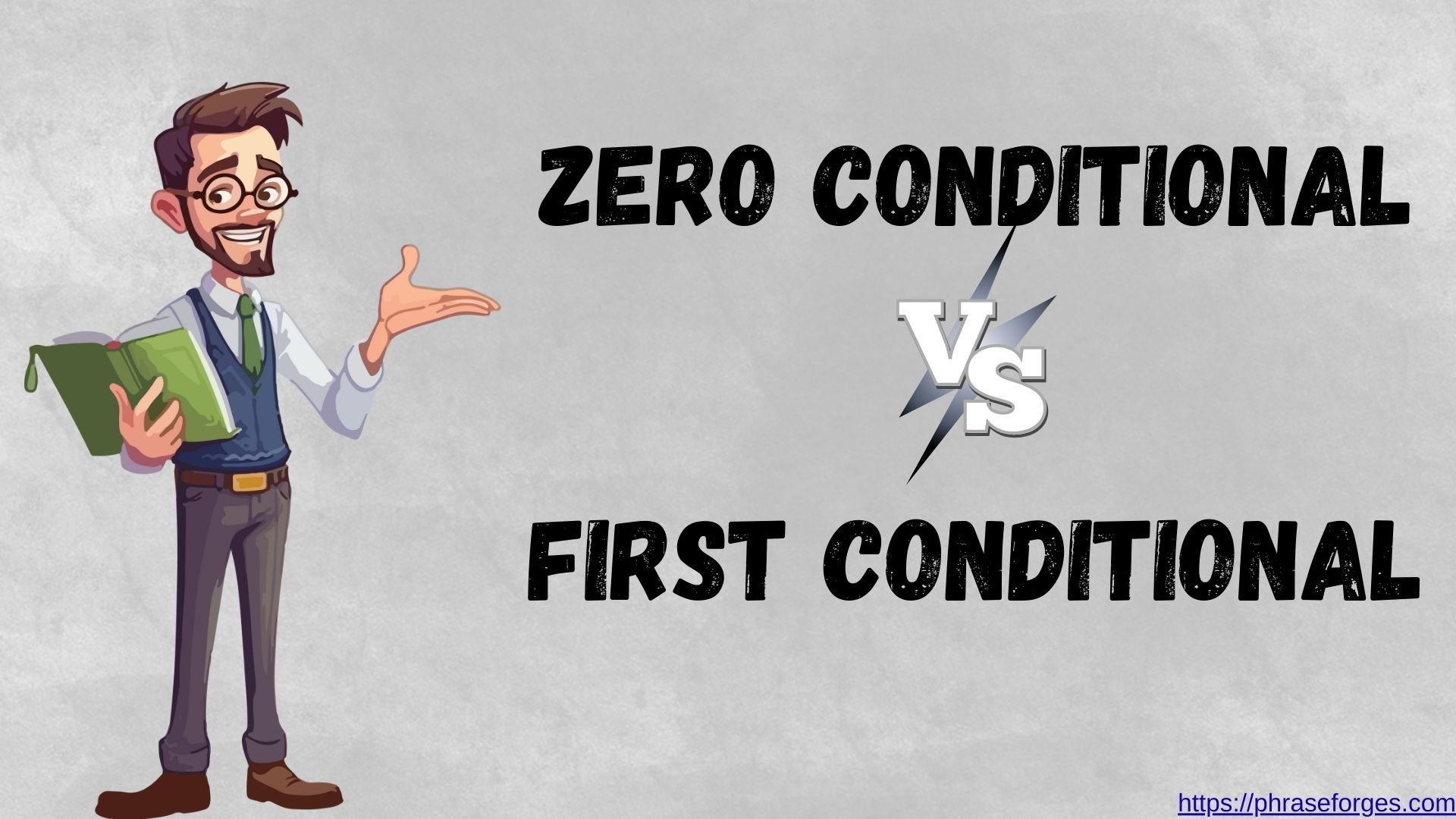Understanding when to use zero conditional vs first conditional is one of those small grammar details that can make a huge difference in clarity. Whether you’re writing emails, telling a story, or explaining processes, knowing the right conditional structure ensures you’re not only grammatically correct but also naturally understood.
This guide dives deep into both conditionals with keyword + intro explanation, real-world scenarios, and practical examples you can use in daily communication.
Simple Definition + Usage Overview

Let’s break it down into simple terms first.
- Zero Conditional: Talks about facts and general truths. If something always happens when a condition is met, you use this one.
- First Conditional: Describes real future possibilities. It’s used when you’re talking about something that might realistically happen later.
Think of it this way:
- Zero = automatic or guaranteed
- First = possible but not guaranteed
Clear Rules & Patterns
Here are the clear grammatical formulas that distinguish both:
Zero Conditional Structure:
- If + present simple, present simple
If you heat ice, it melts.
First Conditional Structure:
- If + present simple, will + base verb
If you study hard, you’ll pass the test.
Bulleted Rules with Do’s/Don’ts
✅ Do’s
- Use zero conditional when the result is always true.
- Use first conditional for real future events or warnings.
- Keep your verbs in the present tense after “if.”
❌ Don’ts
- Don’t use “will” in the “if” clause.
- Don’t use first conditional to describe facts or universal truths.
- Avoid switching verb tenses between clauses without reason.
Multiple Example Sentences
Let’s make things practical. Here are both conditionals in action with examples in daily life:
🔹 Zero Conditional Examples:
- If water reaches 100°C, it boils.
- If you mix red and blue, you get purple.
- If people don’t sleep, they become irritable.
Email Scenario (Zero Conditional):
Subject: Lab Protocols for Safety
Hi Mark,
Just a reminder: If the system detects a fault, it shuts down automatically. Please ensure all sensors are calibrated.
Best,
Sarah
🔹 First Conditional Examples:
- If it rains tomorrow, we’ll cancel the picnic.
- If she calls me tonight, I’ll explain everything.
- If they offer a discount, I’ll buy it.
Email Scenario (First Conditional):
Subject: Friday’s Presentation
Hey Julia,
If the client approves the draft, I’ll finalize the design and send it over. Let’s prepare both versions just in case.
Cheers,
Nathan
Before/After Examples in Everyday and Formal Contexts
Let’s take the same message and reframe it using each conditional, to show how context changes the tone.
Everyday (Zero Conditional):
“If my dog sees a squirrel, he chases it.”
Everyday (First Conditional):
“If my dog sees a squirrel on our walk tomorrow, he’ll definitely run after it.”
Formal (Zero Conditional):
“If the machine overheats, it automatically shuts off to prevent damage.”
Formal (First Conditional):
“If the machine overheats during tomorrow’s test, the system will alert us immediately.”
See how the zero conditional states a fact, while the first conditional predicts a possible outcome?
Common Mistakes & Fixes
Let’s highlight confusion points and correct usage people often mix up.
❌ Incorrect:
If you will touch that wire, you’ll get a shock.
✅ Correct:
If you touch that wire, you’ll get a shock.
Why? Because in first conditional, “will” doesn’t belong in the “if” clause.
❌ Incorrect:
If I eat peanuts, I will get sick.
(Used as a universal allergy reaction)
✅ Better:
If I eat peanuts, I get sick.
(Zero conditional fits better when the reaction is always true.)
❌ Incorrect:
If you mix red and blue, you’ll get purple.
(Sounds like a one-time possibility)
✅ Correct:
If you mix red and blue, you get purple.
(Zero conditional: universal color-mixing rule)
Quick Reference Table
Here’s a summary table for easy quick lookup:
| Feature | Zero Conditional | First Conditional |
|---|---|---|
| Use for | Facts, universal truths, general rules | Real, possible future events |
| Structure | If + present simple, present simple | If + present simple, will + base verb |
| Example | If you don’t water plants, they die. | If you don’t water the plants, they’ll wilt. |
| Time Reference | Any time / timeless | Future |
| Certainty | Always true | Possible or likely |
Fun Analogy to Remember

Think of zero conditional like a vending machine.
If you press the button, the snack drops. Always. No drama.
But first conditional is like ordering food delivery.
If you order now, it’ll arrive in 30 minutes. Probably. But there’s a chance it won’t.
Pro Tip for Learners
You can often replace “if” with “when” in zero conditional, but not in first conditional.
🔹 Zero Conditional:
When you don’t brush your teeth, you get cavities. ✅
(Same as “If you don’t…”)
🔹 First Conditional:
When you don’t reply, she’ll get upset. ❌ (This assumes the action will happen)
Use “if” when you’re not 100% sure about the future. “When” means it’s a done deal.
Email Contrast Example – Both Conditionals Together
Subject: Software Deployment Plan
Hi Arjun,
Just a heads up if the temperature exceeds 75°C, the server shuts down (zero conditional).
And if the migration goes smoothly tomorrow, we’ll finish before noon (first conditional).
Let’s sync up at 8 AM.
Thanks,
Priya
Notice how both conditionals can co-exist naturally in one conversation.
Final Thoughts
Understanding the difference between zero and first conditional lets you write with clarity and confidence, especially in situations where tone, timing, and accuracy matter.
Whether you’re describing scientific laws, giving real-time instructions, or making plans for the future, knowing which conditional to use gives your communication precision and power.
So next time you write an email or have a conversation, ask yourself:
- Is this always true? → Use zero conditional.
- Is this something that might happen? → Use first conditional.

